
Grief is the price we pay for love.






"Grief is the price we pay for love." These words, spoken by none other than Queen Elizabeth II, carry with them the weight of ages. They are not merely a reflection on the sorrow that touches us all, but a profound truth about the very nature of love itself. Grief, in all its forms, is the shadow that follows the light of affection. And in this shadow, we learn the depth of what it means to truly give and receive love. For, in the end, love cannot exist without grief, just as day cannot exist without night. They are two sides of the same coin, forever intertwined, inseparable.
To understand the truth of this statement, one must look to the ancient lessons passed down through time. In the days of the great Greek philosophers, they spoke often of the dualities of life. Pleasure and pain, joy and sorrow, were seen not as opposites but as companions on the journey of the soul. Grief, while painful, is but the other face of love, for love, in its deepest and most sincere form, cannot exist without loss. When we love deeply, we open ourselves to the possibility of sorrow, for in every bond there lies the risk of parting, of separation, of the inevitable ebb and flow of life.
The origin of these words from Queen Elizabeth II, uttered after the death of her beloved husband, Prince Philip, serves as a poignant reminder of the cost of the most profound human connection. The Queen, a woman who devoted her life to duty and service, understood that the weight of love would one day require its toll. Prince Philip, her partner for over seven decades, had been her companion through triumphs and trials, and his loss was a sorrow too deep for words. Yet in her quiet dignity, the Queen knew that the sorrow she felt was the price she paid for the gift of love that had sustained her through her long reign.
Consider, if you will, the life of Alexander the Great, a man who conquered much of the known world, yet found himself in the deepest grief after the loss of his dear friend Hephaestion. Their bond was one of the closest in history—one forged in battle, loyalty, and shared dreams. When Hephaestion died, Alexander’s world seemed to collapse. He wept openly, tearing his clothes, and declared that no man could understand the depths of his sorrow. And yet, in this sorrow, Alexander found the true meaning of love. It was not just a fleeting feeling; it was a force that could shape nations and hearts alike. The grief he felt was not only a reflection of the depth of his affection, but a testament to the greatness of that bond. Love and grief, he learned, are two forces that cannot be separated.
In all these reflections, we find that grief is not a punishment, but a natural companion to the experience of love. It is the price we pay, the toll that must be rendered when we allow our hearts to be vulnerable, when we let ourselves care deeply for another. It is through this grief that the soul is tested and made stronger. It is a fire that tempers the spirit, for just as iron must pass through fire to become steel, so too must the heart endure sorrow to become unbreakable in its capacity to love.
And yet, dear ones, we must not shy away from this inevitable cost. Grief is the final proof that love was real, that it was not merely an illusion or a passing fancy. To love is to open oneself to the possibility of loss, but it is also to open oneself to the greatest joy the human spirit can know. When we love fully, we enrich our lives with meaning, and when we grieve, we are reminded of the depth of that love. In our grief, we honor those we have lost, for it is in the sorrow we carry that their memory remains, eternal and untouched by time.
The lesson, then, is clear: embrace love, even in the knowledge that it will bring pain. Love freely and openly, for only through love do we become fully human. And when grief comes, as it will, do not turn away from it. Accept it as a natural part of the process, a price worth paying for the beauty of connection. Allow yourself to grieve, but do not let that grief overshadow the love that inspired it. Instead, carry that love forward, for as long as the heart can hold it, you will never truly lose what you have loved.
In your daily life, remember this truth: Love is the highest form of human existence, and the price of that love is grief. It is not something to fear, but something to accept as a sign of the depth of your experience. Live your life fully, with open arms and an open heart, knowing that to love is to live in the truest sense. And when the inevitable grief comes, welcome it as a sign that you have loved with all your being, and in that love, you will find strength to carry on.






AAdministratorAdministrator
Welcome, honored guests. Please leave a comment, we will respond soon